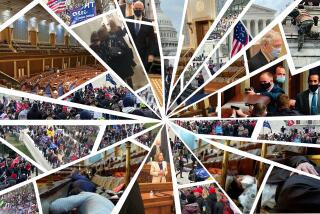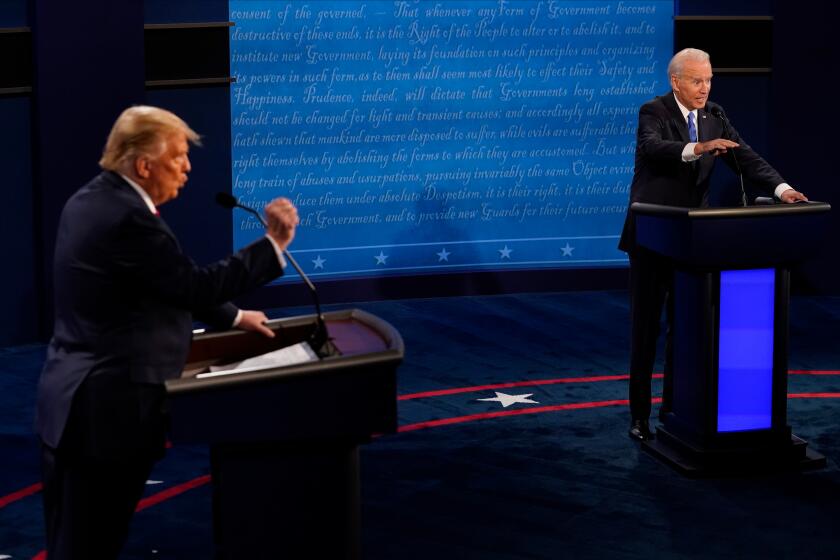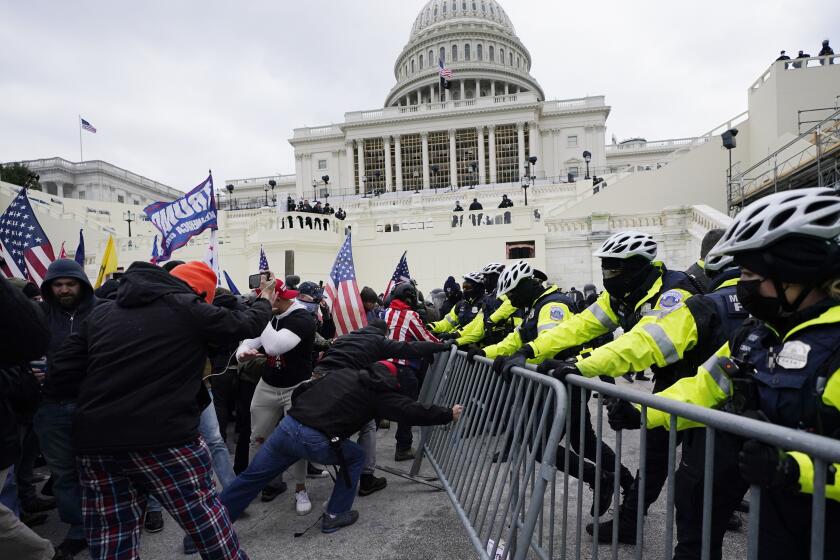Bush May Launch Court Fight Over the Line-Item Veto : Government: A legal test looms after the Senate kills measure to grant the power. Some officials say the President already has such authority.
Needing to shore up conservative support, President Bush is likely to provoke an election-year court test of the theory that he possesses line-item veto power--the authority to delete individual items from congressional spending measures--sources said Thursday.
After the Senate refused, 54 to 44, to approve legislation that would have clearly granted the President that authority, a White House official said it is “almost inevitable” that Bush will seize the earliest opportunity to try to show that he already has such power.
Sen. John McCain (R-Ariz.) said White House aides told him that Bush would be “likely” to take the next appropriations bill that comes to him and blue-pencil specific projects in the measure while approving everything else.
The action undoubtedly would prompt an immediate lawsuit asserting that the Constitution only permits the President to veto legislation in its entirety.
McCain said the unprecedented constitutional confrontation would bolster Bush’s battle against conservative GOP presidential challenger Patrick J. Buchanan by demonstrating that he is strongly committed to obtaining the line-item veto power, a top priority of conservatives.
Bush last month renewed his plea to Congress for a line-item veto, saying that he needs the authority to block “pork-barrel appropriations” such as a museum honoring Lawrence Welk.
But while a court test could win over conservatives and other voters upset by wasteful government spending, it also carries the risk of being viewed as a cynical political ploy if it flops in the courts, several skeptical Administration officials and congressional Republicans said.
A key problem is that Bush’s own attorney general, William P. Barr, has declared that he believes the President has no inherent line-item veto power.
At his Senate confirmation hearing last year, Barr dismissed the interpretation of some scholars that the Constitution provides the President with such authority.
“I looked at that issue and I looked at it hard and spent a lot of time having people research it,” Barr told the Senate Judiciary Committee. “In fact, we went back to ancient English and Scottish constitutions and precedents and so forth. I found no basis for an inherent line-item veto in the Constitution,” he said.
Nevertheless, sources said White House counsel C. Boyden Gray has led “an aggressive and intense effort” in recent weeks to develop a legal foundation and tactical plan for provoking a court test.
In a move to nudge Bush to adopt the plan, GOP lawmakers forced Thursday’s Senate vote on the line-item veto bill, figuring that its expected defeat could be used to demonstrate that “a court challenge was now the only option available to the President,” as one senator put it.
“The entire political environment puts pressure on the President” to seek a court test, said McCain, the chief sponsor of the defeated line-item veto measure.
“There is the $4-trillion deficit,” he continued. “There is the rising anger against pork-barrel spending. . . . And there are the political difficulties the President is experiencing and the need to shore up support among conservatives in his party.”
Senate Appropriations Committee Chairman Robert C. Byrd (D-W. Va.), who led a spirited assault against the line-item bill, which would curb his own panel’s power, said after the vote: “I hope the President will not be led into the thicket of confrontation.”
Otherwise, he added, “there will be a good deal of bitter conflict. . . . And I don’t believe any court in its right mind will” rule that the President already has the ability to strike specific parts of spending bills.
In debate on the McCain measure, Byrd spent an extraordinary eight hours going over centuries of Anglo-Saxon and American history. Accumulated wisdom, he said, gives Congress exclusive power over the purse in a delicate system of checks and balances with the President.
But if a line-item veto were approved, he warned, “we would turn an elected President into a king.”
Proponents argued that the change merely would restore some of the power that the President had before Congress passed the Impoundment Control Act in 1974, curbing his ability to withhold appropriated funds.
“Congress tipped the scales dramatically in its own favor,” Sen. Dan Coats (R-Ind.) complained. Although opponents said the veto would apply to a relatively small part of the budget--sparing Medicare and other entitlement programs--McCain said it could be used to cut significant waste.
He cited a study by Congress’ General Accounting Office that up to $70 billion could have been saved from 1984 through 1989 if Bush and his predecessor, Ronald Reagan, had had the line-item veto.
Times staff writer Douglas Jehl in San Antonio contributed to this report.
More to Read
Get the L.A. Times Politics newsletter
Deeply reported insights into legislation, politics and policy from Sacramento, Washington and beyond. In your inbox three times per week.
You may occasionally receive promotional content from the Los Angeles Times.






